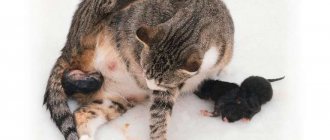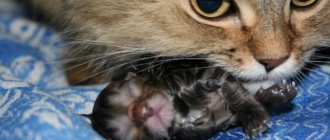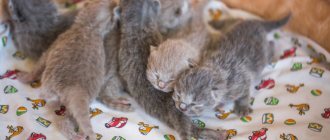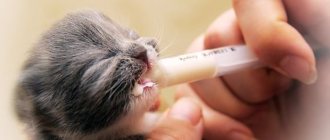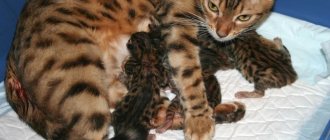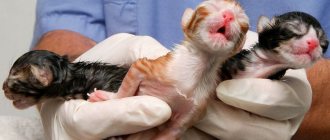What to do
If possible, it is better to call a veterinarian immediately. If this is not possible, you will have to give birth yourself.
Kittens are considered viable if they are already 51 days old. They will not survive any earlier and there is no point in saving them.
Some advise giving the animal an injection to stop contractions (No-shpu, Papazol) in order to prolong pregnancy. But doing this without a doctor's examination is dangerous: perhaps one or more fetuses are dead, and if the cat's body does not get rid of them, blood poisoning will occur.
Cleansing
After they have fed, it is best to leave the kittens with their mother so she can clean them.
When this is no longer the case or the procedure is not carried out, you should clean the back with damp cotton to remove feces and prevent the blankets from becoming overly soiled and causing problems due to poor hygiene.
Can rabbits eat bread? baking? buns?
Causes of jaundice in dogs: symptoms and how to treat the disease
What are hybrid animals? Liger, Mice and their behavior
Rabbits and Spinach: 4 Things to Remember Before Feeding
Benefits and properties of goat milk for dogs
Benefits of Salmon Oil for a Dog's Diet
Food outside the bowl: why does a dog do this?
The Importance of Antioxidants in Dog Food
Are candies dangerous for dogs?
Why do cats give birth prematurely?
Premature lambing in domestic, well-groomed cats is extremely rare . The reason may be one of the following factors :
- The animal was injured (fell, hit, accidentally got under the foot of someone in the household).
- If your pet goes outside, it can pick up an infection there. The disease will provoke early labor.
- The cat was stressed (she was very frightened, a child appeared in the house, renovations began, her beloved owner left for a long time).
- One kitten died in the womb. Here everything happens at the level of functions inherent in nature - the animal’s body spontaneously gets rid of the dead fetus.
- The cat feels a threat to its offspring. This happens very rarely. For example, if a pet lives in a private house and walks in the yard, the appearance of an aggressive dog among neighbors can cause the cat to give birth prematurely - she feels that she will not be able to protect the kittens and gets rid of the litter.
These are the most likely causes of premature birth in a cat. If the animal is already old (the cat is 7-8 years old or more), then the risk of premature pregnancy increases significantly.
Pedigree and selective breeds of cats may not bear their first litter. Their natural instincts are less developed, and pregnancy often occurs with complications.
On time or not?
Firstly, what is “premature” in the case of kittens? To answer this question, you need to know how long pregnancy lasts normally in these animals. If everything is in order, then the kittens are born after 64 days (approximately).
Depending on the breed, the physiological state of the pet, its feeding during pregnancy and other factors, the gestational age (normal) can vary within 55-67 days , and this cannot be considered a deviation from the norm.
The signs of this phenomenon are no different from the usual birth process: the cat meows, worries, looks for a suitable place, etc.
Only in cases where kittens were born between 40 and 50 days can we talk about premature birth . And such situations are called “childbirth” because the babies (at least hypothetically) are quite viable. Anything that happens earlier is called a “miscarriage.”
Kittens born at such a time are very premature and not viable. There are cases when a cat eats miscarriages, which is why the owners then cannot understand why it seems that the formerly pregnant pet does not “decide” to give birth.
reasons for the premature birth of kittens . These include:
- injuries (from falls, for example);
- infectious and non-communicable diseases;
- congenital pathologies, etc.
But, as veterinary practice shows, cats tolerate premature birth well. It's much worse for kittens. Therefore, after premature birth, you have to take care of them, but not of the mother (except, of course, in cases where the birth was caused by severe infectious diseases).
Survival of prematurely born kittens
Almost every baby has a chance of survival. But it’s not the cat who will have to take care of it, but you. Remember that premature kittens are at an initial disadvantage; their vitality is significantly lower than that of their normal relatives. Despite all the care of the owner at home, such babies often do not survive.
Their body is very “fragile” and is more susceptible to various infectious diseases. They grow very slowly and develop much worse. If ordinary kittens are already running quite quickly by the end of the first month, then in premature babies by this time their eyes may just open and they may begin to crawl.
A comfortable external temperature is very important for them, since the thermoregulation system in such babies works extremely poorly. Alas, in many cases there is nothing you can do: the internal organs of premature kittens are often underdeveloped, which will inevitably lead to death (albeit not immediately).
Important! Please note that in cases where the baby, regardless of the characteristics of the food you use, constantly has digestive problems, everything is bad. Most likely, his digestive system is underdeveloped.
Massage
We emphasize once again that the digestive system of premature kittens is almost always underdeveloped. Because of this, in particular, pets almost always have serious problems with peristalsis. In order to somehow stimulate it, you need to regularly massage the abdominal cavity . It should be taken into account that even a cotton pad may be too hard for the extremely delicate skin of a premature kitten.
To avoid injuring the baby, turn on the tap, wait until warm (but not hot) water comes out and, directing it in a thin stream, massage the lower part of the kitten’s tummy, helping with your finger. Before doing this, it won’t hurt to cut your nails (yourself). If the kitten experiences discomfort during the procedure, its intestines will not be activated.
Consequences and complications
The pathology is quite dangerous and is one of the most common causes of child mortality. How favorable the prognosis will be depends on the severity of the baby’s condition and the Apgar indicator. If the score increases, the prognosis is considered favorable.
However, with severe pathology, serious complications develop during the first year of life. Early consequences that may appear in the first few days after resuscitation include :
- respiratory arrest (the most common and dangerous complication);
- pulse failure;
- convulsions;
- cerebral edema;
- disruption of the urinary and digestive systems.
Later disorders include the following diagnoses:
- syndrome of increased excitability (hyperexcitability);
- increased intracerebral pressure (hypertension syndrome);
- lesions of the central nervous system (perinatal encephalopathy);
- disruptions in the functioning of the endocrine and vegetative-vascular systems (hypothalamic disorders).
At what age do cats give birth?
From 7 months, the cat begins to be interested in the opposite sex and becomes sexually mature. If you want to get healthy offspring, veterinarians advise breeding the animal during its second heat.
Cats can give birth until old age, but pet owners should stop their pet’s sex life in time so that the quality of the offspring and the health of the cat are not affected. After all, when abusing a cat’s ability to give birth, people often think only about their own wallet. Thus, to avoid problems, veterinarians recommend spaying or neutering an animal at the age of 6-7 years.
Steps
Part 1
Creating comfort for your kittens
- Dry the kittens with a warm, dry towel.
A good mother cat licks the newborn, removing the innate membrane; this helps dry out the kitten and stimulate its breathing, which is especially important for premature kittens. If the mother is incapacitated, gently dry each kitten in turn with a soft, warm, dry towel. Rub it in small circular motions, imitating a cat licking, and continue until the fur is dry. Keep all kittens together as their mutual warmth will protect them from hypothermia.
- Kittens born prematurely are smaller than normal in size and volume, and therefore prone to rapid hypothermia. This is dangerous because the kitten is unable to control its body temperature, and the chilled kitten's blood flow through the body slows down, causing it to die in a dying state.
- Place the kittens in a cozy, warm, dry sleeping area.
Your premature kittens need to be cuddled together, as they would in the womb, to stay warm. Get a comfort box large enough to fit all the kittens, a towel and a heating pad or warm stuffing. - Make sure the heating pad does not touch them directly, as their delicate skin may be burned. Place it snugly under a layer of towel, where the kittens feel warm but don't risk getting hurt.
- Do not cut the umbilical cord.
Don't be tempted to tamper with the remnants of the placenta hanging from each kitten's belly button. There is no need to cut or trim the placenta as without intervention, it will dry out, dry up and fall off within a few days, regardless of whether the kittens are full term or not. Cutting the placenta can cause hemorrhage, hernia, or even infection in the umbilical cord, which can be fatal to the kitten. - Keep the room temperature around 29-32°C.
A premature kitten is not able to cool down, or vice versa, warm up. Therefore, it is vital that you maintain the correct temperature. In the first three weeks of a newborn's life, you should maintain a body temperature of 35-37° C. To achieve this, the room temperature should be heated between 29-32° C. To make this acceptable to you, heat one room of your house, and let that room will be for your kittens.- Also provide additional heating for their sleeping area. It can take the form of a heat pad or a hot water bottle wrapped in a towel. Fill the bottle with hot water, but make sure that the kitten does not come into contact with the heating pad, as it may burn itself.
Overheating of kittens is also possible. When this happens, their ears feel hot to the touch and they feel heat instead of normal blood temperature. Overheated kittens will become stressed and may vocalize about it. If kittens have the opportunity to move, they will not sit still, but will try to move to a cooler place.
- Feed your kitten milk that is safe for him if his mother cat is not present.
A newborn kitten can only digest milk from its mother cat. If she has refused the kitten, you will need to find a replacement for her milk. Cow's milk is not suitable because it contains lactose, which many cats are unable to digest, resulting in stomach upset. In an emergency when a cat's milk replacer is needed, goat's milk will do no harm and will prevent dehydration in the newborn kitten.- You can get your cat's formula milk substitute online or from your local veterinarian. This formula contains an exact copy of the balance of fats, proteins and vitamins that are contained in the milk of a mother cat. They are produced in powder form and dissolve in boiled water, much like milk replacers for humans.
Always feed your kitten fresh milk, as the high fat content promotes bacterial growth and becomes cloudy quickly.
- Prepare the room and food for your kitten.
Make sure the kitten is warm; a hypothermic kitten will not be able to digest the milk, which will then curdle in its stomach and make it worse. To feed, dissolve a sufficient amount of milk replacer into a sterile feeding bottle. Special feeders for premature kittens are available, they have the advantage of size, are easy to use for tiny kittens and do not spoil the milk. - A premature kitten has a lot in common with cold-blooded animals - if the room is cold, the kitten will not be able to generate enough temperature to produce enzymes for the digestive organs.
Part 2
Feeding your kittens
Place the kitten on its stomach, similar to how it sucks from its mother. You can help your kitten find the pacifier by dropping milk on his lips. Sometimes, if necessary, you can move the lips with your finger to open the mouth, then insert the pacifier inside. Instinctively, most kittens will start sucking.
- Feed him until his tummy is nicely rounded rather than tightly bloated. You can check this by looking if the tummy is wider than the ribcage. This means that the stomach is full and he has now received enough milk. Many kittens fall asleep when they are full. In this case, carefully remove the pacifier from his mouth and place him back in his sleeping place.
Soon after giving birth, the mother cat secretes a special milk called colostrum, which is high in antibody content. These are immune complexes that provide kittens with special immunity from diseases from the mother cat, which can also be called vaccination. This makes them stronger than any other milk, which may be most important for premature kittens.
- Colostrum is rich in vitamins and minerals that are vital for early growth and development to get the best start in life. This also applies to the human body!
A strong kitten will latch onto the nipple if the mother is near it and begin to suck. A weak kitten may need help. To do this, try squeezing a drop of milk/colostrum onto your kitten's mouth to give it a taste and encourage it to latch onto it.
- The lower nipples produce more milk. As colostrum is released, select the lower nipple and gently place all fingers of your dominant hand below the nipple. Use your fingers to gently press and stroke. Do this several times and often, and milk will appear.
Make sure kittens eat often. Premature kittens are completely dependent on their mother's milk. She feeds little and often, feeding newborns every 1-2 hours.
Part 3
Keeping your kittens healthy
- Maintain a healthy feeding schedule.
Premature kittens have tiny bellies and can only hold small amounts of milk at a time. This means that instinctively everyone will suck for 5-10 minutes very often, every 1-2 hours day and night! If you want to successfully raise kittens yourself, there are no shortcuts; each kitten must eat frequently 24 hours a day. Here is a sample feeding schedule:- From the first days of life, feed 2.5 ml of milk replacer every 2 hours
Age 4-7 days, feed 2.5-5 ml 10-12 times a day
- Age 6-10 days, feed 5-7.5 ml 10 times a day
- 11-14 days of age, feed 10-12.5 ml every 3 hours
- 15-21 days old, feed 10 ml 8 times a day.
- From 21 days to 6 weeks of age, feed 12.5-25 ml, 3-4 times a day along with a normal diet. You will know when the kitten is still hungry, he will cry and look for a pacifier.
- Use the syringe to feed the kittens.
Some premature kittens have a weak wetting reflex and have difficulty finding the pacifier. If so, carefully open your mouth and insert your finger between your upper and lower lips. Using a syringe containing milk replacer, place one drop at a time on your kitten's tongue. Let it flow further and trigger a swallowing reflex.- Time and patience are critical as this process cannot be rushed. Never give more than one drop at a time, as large amounts of milk may end up in the trachea before the kitten swallows. He may suffocate, or the milk may enter his lungs and cause pneumonia.
- Encourage your kitten to empty his bladder or bowel.
Newborn kittens are unable to defecate spontaneously. This is explained by the fact that they cannot pollute their rookery, since predators in the wild can find them following convenient tracks. In return, they are held back until the mother cat licks their anus and genital area, which stimulates them to defecate and urinate. You will need to stimulate this reflex artificially. Thus:- Use a cotton ball soaked in warm water. Gently rub the kitten's bottom to simulate licking.
The kitten can then wet the cotton wool. Then throw away the cotton wool.
- Do it this way 3-4 times a day, wash your hands after each time.
How to help during the active stage of labor?
As soon as the cervix is completely open, the organ begins to actively push out kittens. Please note that from now on you should remain completely calm, as your panic will easily be transmitted to your pet. If she gives birth for the first time, it will not lead to anything good.
It is important to follow the following rules:
- Talk calmly and confidently to your cat, stroking it from time to time. The practice of veterinarians around the world proves that such a simple manipulation in most cases is enough to completely calm the pet. Of course, if she completely trusts her owner.
- Warn all household members that the time of childbirth is not the best time to run around the house slamming doors. At such a crucial moment, the animal should not experience any additional experiences (the birth itself is quite enough for him).
- If you also have pets, then the room where the cat gives birth must be carefully isolated from them. At such a time, your pet will even perceive its own relative as a mortal threat to the kittens being born.
- Ensure that the “delivery room” is well ventilated, but do everything possible to protect the room from drafts.
- Prepare a supply of clean drinking water. Many cats experience extreme thirst during childbirth, and therefore do not mind drinking some water. It is advisable to use slightly warmed boiled water.
• If you are very worried and think that you will not be able to cope with the delivery of your pet, make an appointment with your veterinarian in advance. But keep in mind that only its owner can be directly next to a giving birth cat. The “Assistant” will help in case of difficulties. The cat will definitely perceive the presence of strangers next to her as a threat to the kittens.
